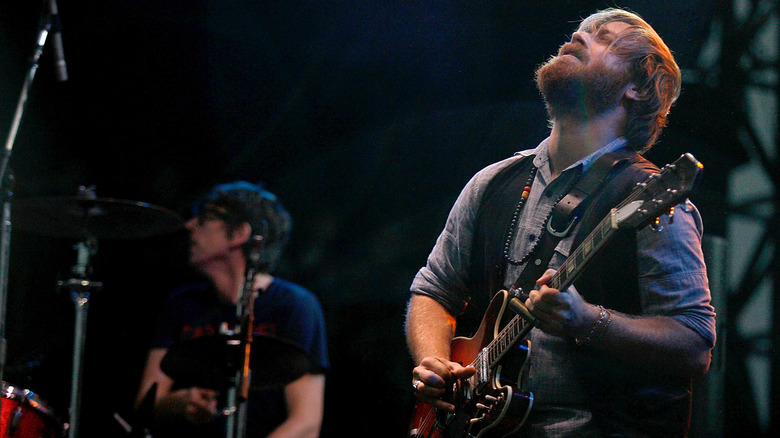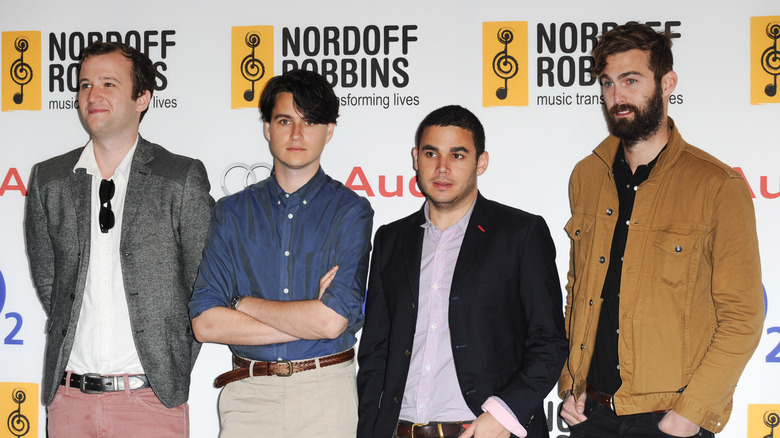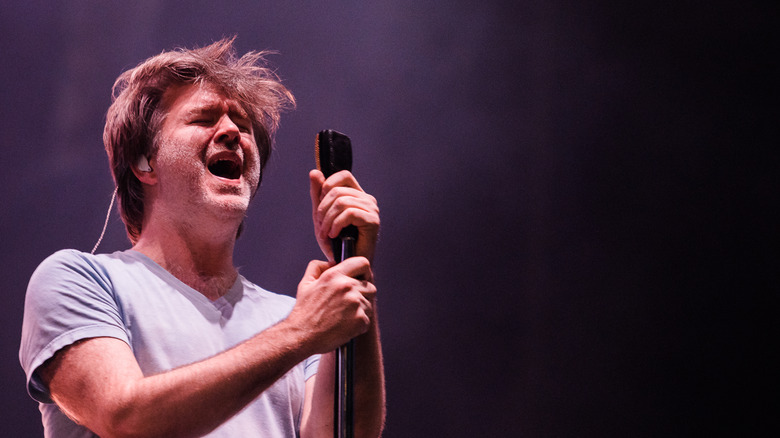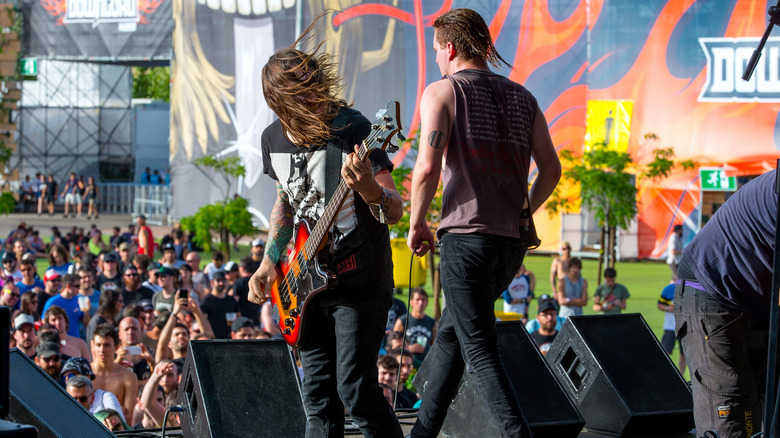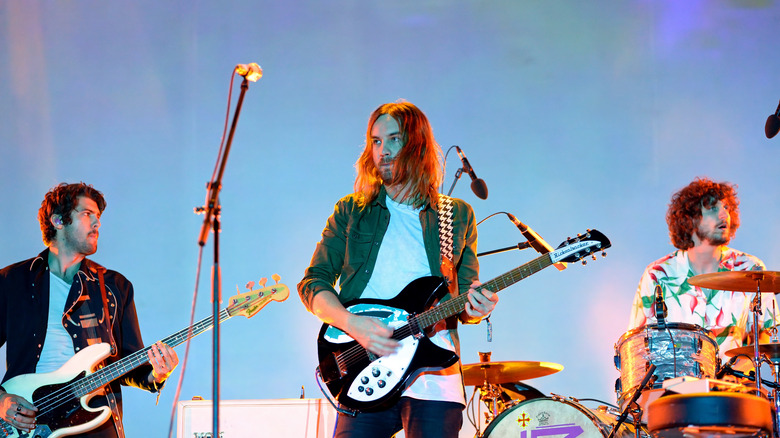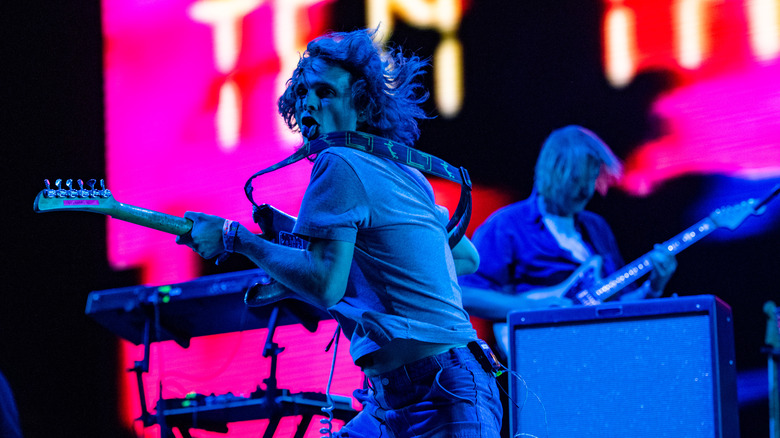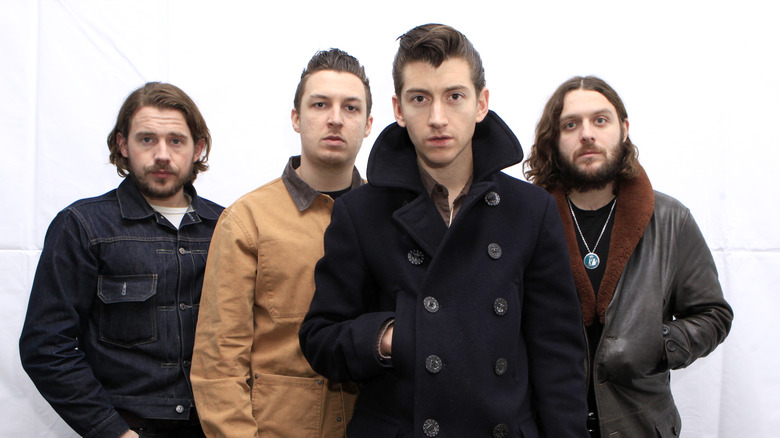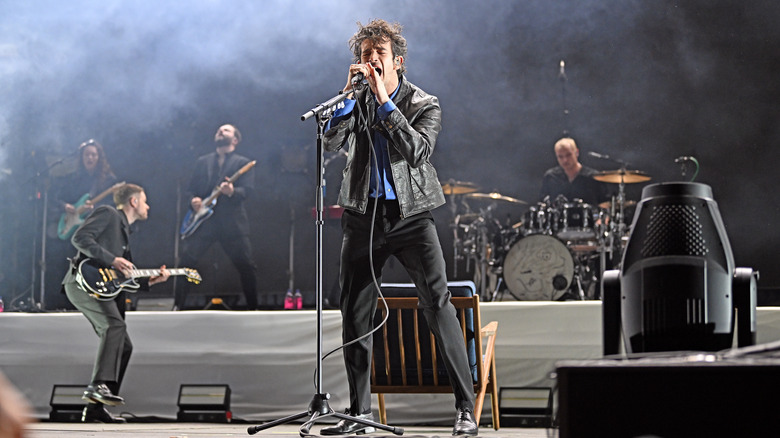The Most Important Rock Bands Of The 2010s
Long-haired air guitar advocates everywhere lost their collective minds in the final years of the 2010s, when it was announced in various news outlets that the era of rock music was well and truly over. Fewer bands were breaking into the commercial charts, journalists said, and just a couple of years later The Guardian seemed to confirm critics' suspicions by reporting that young people didn't want to be in rock bands anymore.
The writing, it appeared, was on the wall. Nobody seemed able to name a rock band that could generate sales and cultural impact in the same way that the biggest names in pop, hip-hop, and electronic music increasingly could.
But the 2010s wasn't precisely a guitarless decade utterly devoid of riffs. Many great rock acts of the 2000s continued to evolve and reach new heights during the decade and merged with other genres in ways listeners hadn't heard before. Here are the rock acts who truly made an impact in the 2010s.
The Black Keys
Many of the bands that dominated the 2010s were already big names in the previous decade. Though The Black Keys had gained a cult following and critical acclaim during their first eight years as a duo, it was only in 2010, with the release of the smash hit studio album "Brothers" — the duo's ninth — that guitarist and vocalist Dan Auerbach and drummer Patrick Carney finally got the attention they deserved.
To many listeners, the music of The Black Keys tended to sound like a conscious throwback to the classic blues sounds of artists such as Howlin' Wolf and R. L. Burnside. But as the musicians themselves argued in The Independent, the sound underpinning their breakthrough singles such as "Tighten Up" and "Howlin' For You" owed as much to the world of hip-hop as it did blues rock, as evidenced by the presence of super-producer Danger Mouse during the recording of "Brothers" and three other Black Keys' albums.
By 2012, The Black Keys were selling out Madison Square Garden within 15 minutes of tickets going on sale, according to Rolling Stone. But the duo remained inconspicuous in public — foreshadowing, perhaps, the attitude of later performers like Ed Sheeran: "Everybody who reaches that kind of level always has a look. Are glasses and beard enough? I don't think so... It's not supposed to happen to bands like us. It's really not. It's crazy."
Radiohead
It's a cliche nowadays to talk about the influence of Radiohead and their role as one of the most important bands of their generation. At the same time, it's perhaps surprising to argue they deserve to be listed among the greatest bands of the 2010s when their most famous work was released in decades previous.
But the fact is that the British band led by Thom Yorke jumped into the new decade with both feet, with the 2011 release of their critically-acclaimed album "King of Limbs." After the release of their comparatively conventional 2007 album "In Rainbows," the band was looking to find a new sound that combined their disparate rock and electronic influences. While the band pushed the envelope on "King of Limbs," their new fusion of styles also performed well commercially, with debut single "Lotus Flower" aided by a memorable, meme-able video featuring Yorke pulling his wildest dance moves. Fans had to wait five years for the follow-up, "A Moon Shaped Pool," though that too was met with widespread critical acclaim.
The two albums Radiohead released over the decade were each certified gold, showing their commercial impact even as Yorke and co. investigated more obscure corners of their eclectic sonic palette. Radiohead's genre-bending has also made them influential outside of the alt-rock scene, with a new generation of alternative R&B artists such as Frank Ocean and Janelle Monáe using the British avant-garde rockers as a touchstone, as reported by The Guardian.
Vampire Weekend
The end of the 2000s was populated by a great number of popular indie bands who looked likely to push on to greater heights in the 2010s, including Vampire Weekend.
In 2008, the band's debut hit No. 17 on the Billboard chart, a respectable feat that showed they might continue to compete with other major groups such as Animal Collective and Passion Pit. But in fact, Vampire Weekend was utterly dominant during the 2010s, with three No. 1 albums starting with 2010's "Contra," moving on to 2013's "Modern Vampires of the City," and concluding with "Father of the Bride" in 2019. Not only that, but their cultural impact was enormous, including their crossovers into hip-hop, and, in terms of style, pioneering a slick pretty look that would become a signature, much-imitated style.
Now arena-filling indie-pop veterans, Vampire Weekend show no sign of stopping, though, as usual, they are taking time between releases.
LCD Soundsystem
It's arguable that a band that wasn't together for half of the 2010s doesn't deserve a place on the list of the most important bands of the decade. But when it comes to dance-punk pioneers LCD Soundsystem, even their break-up was heralded as one of the biggest musical moments of the decade. Having just enjoyed the massive commercial success of their 2010 album "This Is Happening," the band announced they were splitting. "I've always thought there's a lot of power in being flippant if you're willing to carry it through," bandleader James Murphy told The Guardian. "It's like, if two people have guns pointing at each other and the first person doesn't care if they live or die, the other one should put the gun down."
Murphy's gamble — if it can be called that — paid off. The farewell shows became huge news, leading to the release of the 2012 documentary "Shut Up and Play The Hits" and the acclaimed live album "The Long Goodbye: LCD Soundsystem Live at Madison Square Garden" in 2014. When Murphy found, after a few years' hiatus, that he was interested in writing music again, he reformed the band. "American Dream" (2017) was yet another commercial smash.
But LCD Soundsystem's successes didn't occur in a vacuum; their sound was also incredibly influential on hot indie bands who would go on to become big names later in the decade, such as The 1975 (via Vice).
Deafheaven
It can't be said that Deafheaven gets much radio play, nor do they form the soundtrack of that many TikTok videos. But for many of those who explore the niche corners of post-metal and its subgenres, their music counts among some of the most important of the decade, with Vice going as far as to describe them as one of a handful of "artist[s] of the decade" in a retrospective in of the 2010s. But why?
Much of their impact boils down to a single album: "Sunbather," which was released in 2013 to widespread awe from music critics. Billed as black metal, "Sunbather" surprises from the opening track, "Dream House," folding in disparate and unexpected styles, such as shoegaze, into an aggressive but hypnotic sound unlike anything that metal was used to, and bursting open the boundaries of the genre as a result.
In another retrospective by Everything is Noise, critics note that the genre-bending of "Sunbather" didn't please black metal purists; nevertheless, it has gone down as a definitive record demonstrating what the genre might be capable of in the 2010s and beyond.
Haim
San Fernando Valley siblings Este, Danielle, and Alana Haim became global megastars over the course of the 2010s, earning a rep as one of the few groups to incorporate classic rock sounds into their chart-infiltrating pop songwriting successfully.
Per Rolling Stone, the trio was well-known on the California scene from an early age, networking with acts like Jenny Lewis and creating a buzz around their music so that their debut, 2013's "Days Are Gone," was released on a wave of hype, selling 90,000 copies in the U.S. in a week. Haim proved that riffs could sell and became one of pop rock's biggest names of the new millennium. And they did it by taking soft rock influences from the '70s and '80s and effortlessly blending them with contemporary pop.
Though the band released just one more album during the decade — 2017's "Something To Tell You" — by the release of their third album in 2020, the Outkast-inspired "Women In Music Pt. III," they had become embedded in the pop firmament, free to tackle darker subjects across a range of genres ... and still manage to sell-out Madison Square Garden (via The New Yorker).
Tame Impala
Operating, like LCD Soundsystem, around the vision of a single bandleader — Australian multi-instrumentalist Kevin Parker — Tama Impala proved themselves to be the premier commercial purveyor of psych rock in the 2010s, reviving a sound most associated with the 1960s and '70s and taking it up the charts.
Another one of Vice's "artist[s] of the decade," Parker's technology-driven working methods — which involve employing a range of effects pedals in new and innovating ways, as well as looping and sampling — bring a modern twist to the sounds Parker references. In doing so, Parker became a poster boy for the 2010's genre-defying omnivorism exhibited by both artists and listeners, who saw pop, hip-hop, and alternative rock merge in exciting new ways.
Breaking through with 2012's "Lonerism," by the end of the decade Tame Impala was headlining the world's biggest festivals and preparing the release of "The Slow Rush," their fourth album, in 2020.
King Gizzard & The Lizard Wizard
On the reverse side of the Australian psych-rock explosion of the 2010s, King Gizzard & The Lizard Wizard has managed to maintain a level of productivity unheard of by most mainstream bands, as well as a frantic touring schedule that has won them countless fans the world over thanks to their frenetic, high-energy stage shows.
Starting out as something of a joke band — a side project for a group of musicians and friends who were also busy performing in other bands — King Gizzard soon took on a life of its own through the vision of primary lyricist Stu Mackenzie. Over the course of the 2010s, King Gizzard released a grand total of 15 studio albums — including five in 2017 alone — encompassing everything from psychedelia to tropicalia and even venturing into the microtonality of Indian music with specially-designed guitars. The band has continued its frenetic release schedule with two albums in the early 2020s recorded during the COVID pandemic.
Queens of the Stone Age
By the end of the 2000s, Josh Homme's iconic band Queens of the Stone Age had already established themselves as a major classic rock outfit of the 21st century. They'd achieved chart success thanks to timeless tracks like 2002's "No One Knows" and 2007's "Make It Wit Chu," which married heavier rock sounds with danceable rhythms. Fan-favorite studio albums such as "Songs for the Deaf" and "Era Vulgaris" have also stood the test of time.
Arguably, though, Queens of the Stone Age truly hit their peak in the decade that followed, with the 2013 album "...Like Clockwork," their first U.S. No. 1 on the Billboard chart. The band followed up with the release of "Villains" in 2017. The group nearly missed fulfilling their dreams, however. Queens of the Stone Age could all have ended in 2010, when Homme nearly lost his life on the operating table because of complications from knee surgery.
Thankfully, Homme and the Queens lived to fight another day, and to release two majestic albums in the decade that followed. While the band has continued to explore commercial crossovers — "Villains" was produced by pop-supremo Mark Ronson — the feeling is still experimental and forward-thinking: "I'm not going to wait," Homme told The New York Times. "Your willingness to take a risk is its own reward in this day and age."
Arctic Monkeys
Arctic Monkeys, the British indie rock band led by Alex Turner, became a sensation in Europe in the mid-2000s — but took things to another level entirely during the 2010s.
For a band whose albums were as feted in their home country as 2006's "Whatever People Say I Am, That's What I'm Not" and the 2007 follow-up "Favourite Worst Nightmare," Arctic Monkeys were having a difficult time breaking into the lucrative U.S. market. That all changed in 2013, however, with the release of "AM," a new, polished take on their early indie sound that incorporated elements of club music and hip-hop on songs such as the Grammy-nominated "Do I Wanna Know?" The album went to No. 1 on the Billboard Hot 100, precipitating a sell-out U.S. arena tour — a transformation in the band's fortunes compared to the previous year, when they were the support act for The Black Keys.
The seeds of their breakthrough were arguably planted much earlier, according to the NME's Mike Williams. Reviewing the triumphant "AM," Williams noted much of the crossover sound that was to propel the Arctic Monkeys to worldwide megastardom owed a debt to their 2009 album "Humbug," parts of which were recorded and produced in the Mojave Desert under the guidance of Queens of the Stone Age's John Homme.
The 1975
Another band that attracted a huge buzz in the U.K. before becoming a monster act in the U.S. was The 1975, though it took them comparatively little time to make their commercial breakthrough. Having topped the charts in Britain with their self-titled debut album in 2013, the band led by Matthew Healy announced their follow-up, "I Like it When You Sleep, for You Are So Beautiful Yet So Unaware of It," which made No. 1 on both sides of the Atlantic in 2016.
As noted by Rolling Stone, Healy's songwriting incorporates the influence of classic British hip-hop acts such as The Streets, which presents gritty scenes and narratives that are true to life, combined with the emotiveness of emo, with the band intentionally stepping up the excesses of their first album. Nevertheless, The 1975 has received a lot of hate, especially from rock purists and those who believe they are too knowingly commercial. Healy, however, says that having their work dismissed has led them to lean harder into their aesthetic. "Every criticism, every compliment, every conversation surrounding that first album has been included and been exaggerated," he told Rolling Stone.
With five consecutive U.K. No. 1 albums under their belts and continued chart success around the globe, The 1975 has emerged in the 2020s as one of the world's biggest touring rock bands, competing with the likes of Coldplay and Muse as crowd-pleasing festival headliners.
The Fall
One band that has made a surprising impact on rock music in the 2010s and beyond is The Fall, a relatively obscure art-punk group established in 1976. Led by the famously irascible Mark E. Smith, the group's vocalist, lyricist, and single constant member, The Fall released hundreds of albums over the course of a four-decade career and were a huge influence on bands such as LCD Soundsystem and Arctic Monkeys, as well as older alternative acts such as Sonic Youth and Pavement (via Brooklyn Vegan).
Smith died in 2018 at the age of 60, meaning that the highly prolific and influential punk institution had finally come to an end. Though The Fall was an obvious touchstone for numerous bands that broke through in the 2010s such as Protomartyr and Idles, since then, Smith's idiosyncratic style of "speak-singing" has become a common aesthetic choice for new post-punk bands such as Fontaines DC, Dry Cleaning, and many more.

